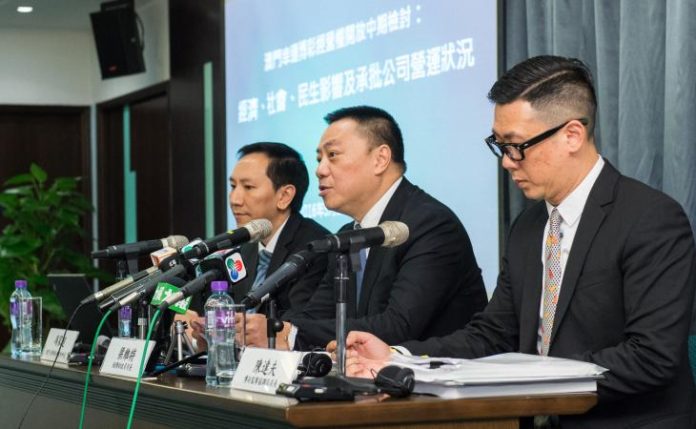Macaus casino operators were all found to have fulfilled the capital commitments in their contracts during the period under evaluation, with the six investing a total of more than MOP262.31 billion (US$32.82 billion) in the SAR during the period between 2002 and 2014, according to a government-commissioned interim review of the 20-year gaming licences issued.
The Interim Review of Gaming Liberalization for Games of Fortune in Macao: economical, social, livelihood impacts and operating conditions of the Concessionaires covers nine research topics divided into four primary sections: Economy, Society and quality of life of the population, compliance with the contractual obligations and commercial exploitation on behalf of the concessionaires and sub-concessionaires and gaming promoters.
The report was commissioned by the Office of the Secretary for Economy and Finance and conducted by the Institute for the Study of Commercial Gaming by the University of Macau with a delivery date set for September 2015. The results of the research team concluded that the six gaming operators have all fulfilled the capital commitments in their contracts and that the gaming industry has created both positive and negative impacts upon the society and economy of Macau.
Casinos follow through
Of the MOP262.31 billion accrued by all six gaming operators over 13 years, The Venetian Macao was found to have invested most in the territory – some MOP86.97 billion – amounting to 33 per cent of the total investment by the casino resorts in the territory. Melco held the second highest investment, of MOP52.68 billion, amounting to 20 per cent, closely followed by Galaxy, with MOP50.91 billion, making up 19 per cent. These were trailed by Wynn MOP31.83 billion (12 per cent), SJM MOP21.89 billion (8 per cent) and MGM MOP18.02 billion (7 per cent).
The Venetian also led the way by sector, with the proportion of its non-gaming revenues making up 79 per cent of its overall take in 2014, compared to SJM, which made up 98 per cent of its revenue from gaming.
Wynn came a close second, with 87 per cent, while Melco had 91 per cent, MGM 95 per cent and Galaxy at 96 per cent.
Bigger non-gaming
“To make the industry bigger, noted Secretary for Economy and Finance Lionel Leong Vai Tac, we shouldnt just look at gaming revenue, not just quantity [
] we hope to help the sector improve the process how to improve mass market, to increase investment in non-gaming, in other sectors of Macau, this will be our focus, he stated.
Total non-gaming revenues in 2014 for the six operators generated MOP23.2 billion. In the same year, the report notes, the state of Nevada generated casino revenues amounting to one million or more American dollars corresponding to 44.5 per cent of the overall economic activities undergone – which proves, according to the report that the division between the revenues from the gaming sector and the non-gaming activities in the MSAR are excessively concentrated. This led to the report noting that The Venetian is relatively superior to the rest of the concessionaires/sub-concessionaires in the division of gaming and non-gaming activities and the number of employees engaged in these sectors.
Hashers rules on junkets
“We cannot only depend upon a small number of people, a small number of customers to generate the largest revenue. In the face of international competition we need to discover new customers, new growth points, said Secretary Leong on the sidelines of the interim report launch.
Between 2002 and 2014 the dependence upon gaming promoters has fallen, as the trend shifts towards the mass market. When more than a decade ago, 60 to 70 per cent of the gross profit of casinos came from VIP rooms, notes the report, in 2015 this figure had dropped to around 54 per cent.
The report notes that the main problems facing junket operations are related to: access and termination of activity, increase of negotiating power, credit for play and betting, deposit of funds and chips and their protection, raising funds and deposits, and the illicit use of commercial gaming.
Paulo Martins Chan, Director of the Gaming Inspection and Co-ordination Bureau described the junket operations as very important to Macaus gaming industry and that we have to recognise its position; we also have to admit that there will be irregularities in junket regulations and we have to implement regulation to control this.
The director believes it necessary to create a database relating to junket activity, including debtors, stating that it is important to the healthy development of the sector, and noting that, through talks with junket operators the group thinks its feasible and that we need support from the public and a consensus from the legal sector. In terms of the departments activities anything, any measure that is going to help the development of the sector, as long as its legal, we will do it. This includes increasing the threshold for entry for gaming promoters from its current MOP100,00 to a potential MOP10 million.
Licence renewal
Regarding the renewal of the 20-year concessions on the gaming contracts no decisions were announced, although Secretary Leong noted We have to be very cautious. We need to know what steps we will take to guarantee our competitiveness in the global arena, stating a need to have better soil for the healthy growth of the gaming industry.
Leong stated that he believed the Macau people are concerned about the economic development of the SAR, given its reliance upon the gaming sector, noting that different places in the world, including our neighbouring regions have gaming industries, and that we need to make the gaming operators aware of the fact that the mass market can be further developed.
He added at Wednesdays briefing that the government will also have to consider the quality of life of Macau residents when considering whether to renew casino licences.
























